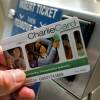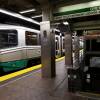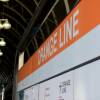Come next Friday, Aug. 19, people who take the Orange Line are going to need to find another way to get around when the MBTA begins a monthlong shutdown. That includes Boston Mayor Michelle Wu, who regularly rides the T's Orange Line to City Hall. Wu joined GBH’s Morning Edition hosts Paris Alston and Jeremy Siegel for a phone call before she got on her bike to ride to City Hall Thursday. This transcript has been lightly edited.
Jeremy Siegel: The T is planning to have shuttle buses for Orange Line riders, and is also encouraging people to use Commuter Rail when they can. Is your plan to keep biking come Aug. 19?
More Local News
Mayor Michelle Wu: My goal actually is to mix it up so I can personally see all the different routes and options that are available. So I think on the first day I'll probably just try to take one of the shuttle buses and really experience that all the way through.
Commuter rail is another option. The commuter rail will essentially be free to those who have a CharlieCard, and you can get a free CharlieCard at libraries and other locations. You just show it, get on any stop within the city of Boston. And so from Forest Hills to Back Bay or Ruggles or South Station will be basically free for anyone, and they'll be running at increased frequency.
And then there's biking and trying to find a bus route for one of the other existing routes of connection.
Paris Alston: So you're known as an avid T rider, but take us inside this bike ride that you take to City Hall. I mean, this is something you also did last week. But considering that Boston drivers aren't always the friendliest, do you feel safe riding on the roads? And are the bike rides at all motivated by what has been happening with the T lately, or is this something that you would do regardless?
Wu: The honest truth is that I don't feel safe at every moment on the roads. I don't think anyone who rides their bike in Boston does, unless you're lucky enough to have a commute that is really just centered on one of the corridors where we already have safe, protected cycling infrastructure in place.
I used to bike a lot more, but then as the kids got to an age where I needed to commute with both of them into City Hall child care, I did not feel safe biking with them on the back or with me in some way. So we really we then changed to stroller and the MBTA. Now they're both in school and it's over the summer, so I've been meaning to get on for a little while, and this has been an extra push to get me there. But today I'm riding with some fellow neighborhood bike advocates and others, and I'm told that the sign up are quite large. So we'll have a little convoy going from Roslindale to downtown.
Great to be with @MayorWu, who says she is going to continue to do regular rides with constituents! pic.twitter.com/r84pu0mW97
— BostonCyclistsUnion (@bostonbikeunion) August 11, 2022
Siegel: Safety is an issue that a lot of cyclists have been pointing out lately. Right around when you did your last ride to work, a group of cyclists held a kind of protest where they made what they called a people protected bike lane along Charles Street, calling on your office to address gaps in the downtown bike lane network along Charles and Cambridge streets. What sort of plans do you have to address this, if any? And what are they?
Wu: We actually are working on a good chunk of downtown cycling infrastructure, but our cycling infrastructure has to be accessible and connected all across the city and especially in our neighborhoods as well. So we will be announcing some of the completed and in-progress pieces of that in the coming weeks, I think later in this month. But we can't move fast enough on this.
It's not only how do we ensure that we are ramping up the in-house engineering and design and all the things that, having to contract externally, can stretch on in timelines in terms of installing these bike lanes. And how do we really look at the places where a connection would open up a route for a lot more people, as opposed to counting just by miles of completed bike lanes, which may not all meet up with each other? Then you're kind of still back out into traffic that feels quite dangerous. And so we want to make, route by route, this commute possible and safe and convenient for people all across the city in our neighborhoods.
Alston: So Mayor Wu, going back to the T — because we are about a week out from those closures — how are you and other riders going to be finding other modes of transportation? Especially considering that you've said earlier this week that is going to be chaos. How much confidence do you have in the T to be able to do this seamlessly? And furthermore, do you think that this shutdown is what the team needs right now?
Wu: The city is working hand-in-hand with the T right now to try to manage the alternatives. When I was asked earlier this week, "How do you avoid chaos in the situation?" My honest answer is there will be some chaos. There just will be, for commuters who are used to a schedule, who are used to predictability. And the last thing that should be taking up your brain space before you get to your job, before you get to school, and the things that are really going to be taking your time and energy is how to get there in your usual schedule.
"The honest truth is that I don't feel safe at every moment on the roads, and I don't think anyone who rides their bike in Boston does."-Boston Mayor Michelle Wu
But unfortunately, for four weeks, that will be a bit disrupted again as people have to navigate all the different options. But I want to emphasize: it's not like the Orange Line is being shut down and people have no option in its place. They just kind of have to find their way. There are shuttle buses that will be running — I hope, fingers crossed, not stuck in traffic — but running at pretty fast frequency throughout the route. There's a South Side shuttle that will take folks from the end of the Orange Line at Forest Hills to Copley. There's a North Side shuttle that will come in from the end point [at Oak Grove] into Government Center.
We're trying to figure out the logistics of how those run. We're expanding bus priority for routes that are likely going to see a higher ridership because they kind of run parallel to certain parts of the Orange Line. And again, trying to smooth the way-finding, commuter rail, multilingual signage, ensuring that the options are very clear ahead of time so people can do those searches.
And then the last place is the city is putting a lot of time and effort is into plans specifically for our students, because it does overlap — the last week of the shutdown is the first week of school in Boston Public Schools. And we know this is not something that we ever should have gotten to. But we are here now because of deferred maintenance over decades and lack of urgency even in recent years. We're going to push to make sure that everything that's promised to get done will get done, and we'll have better service after these four weeks.
Siegel: There's a push for a federal takeover of the T. This is something that you've said isn't necessary, but you said yourself that there's going to be chaos. For someone who's seeing their line go away, do you still believe that there shouldn't be a federal takeover and why not?
Wu: I always believe that those who are closest to the challenges know best how to solve them. And we certainly need Federal Transit Administration oversight. It's already been proving helpful in identifying areas of focus and ways that the T could be accelerating what should have been done a long time ago. But if anything, to give up control to an entity even further away, I think, raises questions and unpredictability. We need local cities to have a bigger voice.











